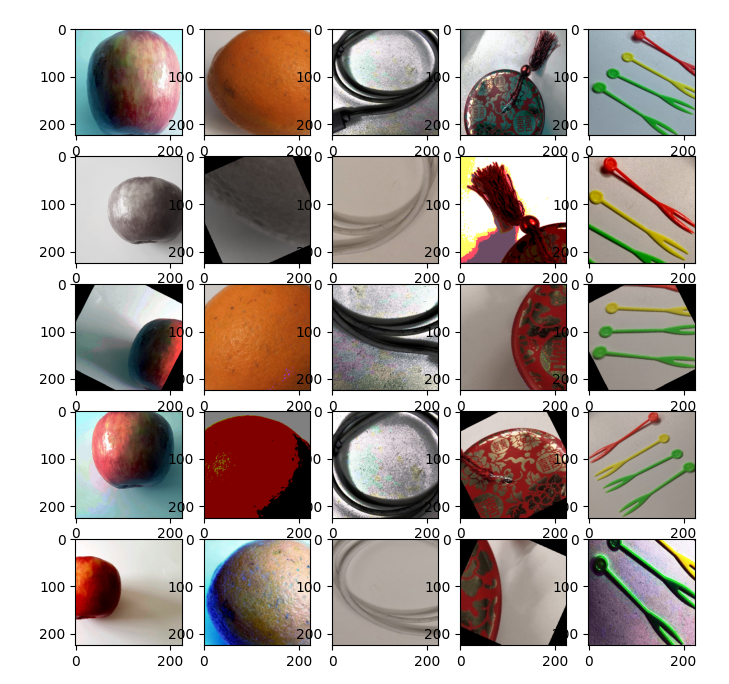应用自动数据增强
Linux Ascend GPU CPU 数据准备 中级 高级
概述
自动数据增强(AutoAugment)[1]是在一系列图像增强子策略的搜索空间中,通过搜索算法找到适合特定数据集的图像增强方案。MindSpore的c_transforms模块提供了丰富的C++算子来实现AutoAugment,用户也可以自定义函数或者算子来实现。更多MindSpore算子的详细说明参见API文档。
MindSpore算子和AutoAugment中的算子的对应关系如下:
AutoAugment算子 |
MindSpore算子 |
描述 |
|---|---|---|
shearX |
RandomAffine |
横向剪切 |
shearY |
RandomAffine |
纵向剪切 |
translateX |
RandomAffine |
水平平移 |
translateY |
RandomAffine |
垂直平移 |
rotate |
RandomRotation |
旋转变换 |
color |
RandomColor |
颜色变换 |
posterize |
RandomPosterize |
减少颜色通道位数 |
solarize |
RandomSolarize |
指定的阈值范围内,反转所有的像素点 |
contrast |
RandomColorAdjust |
调整对比度 |
sharpness |
RandomSharpness |
调整锐度 |
brightness |
RandomColorAdjust |
调整亮度 |
autocontrast |
AutoContrast |
最大化图像对比度 |
equalize |
Equalize |
均衡图像直方图 |
invert |
Invert |
反转图像 |
ImageNet自动数据增强
本教程以在ImageNet数据集上实现AutoAugment作为示例。
针对ImageNet数据集的数据增强策略包含25条子策略,每条子策略中包含两种变换,针对一个batch中的每张图像随机挑选一个子策略的组合,以预定的概率来决定是否执行子策略中的每种变换。
用户可以使用MindSpore中c_transforms模块的RandomSelectSubpolicy接口来实现AutoAugment,在ImageNet分类训练中标准的数据增强方式分以下几个步骤:
RandomCropDecodeResize:随机裁剪后进行解码。RandomHorizontalFlip:水平方向上随机翻转。Normalize:归一化。HWC2CHW:图片通道变化。
在RandomCropDecodeResize后插入AutoAugment变换,如下所示:
引入MindSpore数据增强模块。
import matplotlib.pyplot as plt import mindspore.dataset as ds import mindspore.dataset.transforms.c_transforms as c_transforms import mindspore.dataset.vision.c_transforms as c_vision from mindspore import dtype as mstype
定义MindSpore算子到AutoAugment算子的映射:
# define Auto Augmentation operators PARAMETER_MAX = 10 def float_parameter(level, maxval): return float(level) * maxval / PARAMETER_MAX def int_parameter(level, maxval): return int(level * maxval / PARAMETER_MAX) def shear_x(level): v = float_parameter(level, 0.3) return c_transforms.RandomChoice([c_vision.RandomAffine(degrees=0, shear=(-v,-v)), c_vision.RandomAffine(degrees=0, shear=(v, v))]) def shear_y(level): v = float_parameter(level, 0.3) return c_transforms.RandomChoice([c_vision.RandomAffine(degrees=0, shear=(0, 0, -v,-v)), c_vision.RandomAffine(degrees=0, shear=(0, 0, v, v))]) def translate_x(level): v = float_parameter(level, 150 / 331) return c_transforms.RandomChoice([c_vision.RandomAffine(degrees=0, translate=(-v,-v)), c_vision.RandomAffine(degrees=0, translate=(v, v))]) def translate_y(level): v = float_parameter(level, 150 / 331) return c_transforms.RandomChoice([c_vision.RandomAffine(degrees=0, translate=(0, 0, -v,-v)), c_vision.RandomAffine(degrees=0, translate=(0, 0, v, v))]) def color_impl(level): v = float_parameter(level, 1.8) + 0.1 return c_vision.RandomColor(degrees=(v, v)) def rotate_impl(level): v = int_parameter(level, 30) return c_transforms.RandomChoice([c_vision.RandomRotation(degrees=(-v, -v)), c_vision.RandomRotation(degrees=(v, v))]) def solarize_impl(level): level = int_parameter(level, 256) v = 256 - level return c_vision.RandomSolarize(threshold=(0, v)) def posterize_impl(level): level = int_parameter(level, 4) v = 4 - level return c_vision.RandomPosterize(bits=(v, v)) def contrast_impl(level): v = float_parameter(level, 1.8) + 0.1 return c_vision.RandomColorAdjust(contrast=(v, v)) def autocontrast_impl(level): return c_vision.AutoContrast() def sharpness_impl(level): v = float_parameter(level, 1.8) + 0.1 return c_vision.RandomSharpness(degrees=(v, v)) def brightness_impl(level): v = float_parameter(level, 1.8) + 0.1 return c_vision.RandomColorAdjust(brightness=(v, v))
定义ImageNet数据集的AutoAugment策略:
# define the Auto Augmentation policy imagenet_policy = [ [(posterize_impl(8), 0.4), (rotate_impl(9), 0.6)], [(solarize_impl(5), 0.6), (autocontrast_impl(5), 0.6)], [(c_vision.Equalize(), 0.8), (c_vision.Equalize(), 0.6)], [(posterize_impl(7), 0.6), (posterize_impl(6), 0.6)], [(c_vision.Equalize(), 0.4), (solarize_impl(4), 0.2)], [(c_vision.Equalize(), 0.4), (rotate_impl(8), 0.8)], [(solarize_impl(3), 0.6), (c_vision.Equalize(), 0.6)], [(posterize_impl(5), 0.8), (c_vision.Equalize(), 1.0)], [(rotate_impl(3), 0.2), (solarize_impl(8), 0.6)], [(c_vision.Equalize(), 0.6), (posterize_impl(6), 0.4)], [(rotate_impl(8), 0.8), (color_impl(0), 0.4)], [(rotate_impl(9), 0.4), (c_vision.Equalize(), 0.6)], [(c_vision.Equalize(), 0.0), (c_vision.Equalize(), 0.8)], [(c_vision.Invert(), 0.6), (c_vision.Equalize(), 1.0)], [(color_impl(4), 0.6), (contrast_impl(8), 1.0)], [(rotate_impl(8), 0.8), (color_impl(2), 1.0)], [(color_impl(8), 0.8), (solarize_impl(7), 0.8)], [(sharpness_impl(7), 0.4), (c_vision.Invert(), 0.6)], [(shear_x(5), 0.6), (c_vision.Equalize(), 1.0)], [(color_impl(0), 0.4), (c_vision.Equalize(), 0.6)], [(c_vision.Equalize(), 0.4), (solarize_impl(4), 0.2)], [(solarize_impl(5), 0.6), (autocontrast_impl(5), 0.6)], [(c_vision.Invert(), 0.6), (c_vision.Equalize(), 1.0)], [(color_impl(4), 0.6), (contrast_impl(8), 1.0)], [(c_vision.Equalize(), 0.8), (c_vision.Equalize(), 0.6)], ]
在
RandomCropDecodeResize操作后插入AutoAugment变换。def create_dataset(dataset_path, do_train, repeat_num=1, batch_size=32, shuffle=True, num_samples=5, target="Ascend"): # create a train or eval imagenet2012 dataset for ResNet-50 dataset = ds.ImageFolderDataset(dataset_path, num_parallel_workers=8, shuffle=shuffle, num_samples=num_samples) image_size = 224 mean = [0.485 * 255, 0.456 * 255, 0.406 * 255] std = [0.229 * 255, 0.224 * 255, 0.225 * 255] # define map operations if do_train: trans = [ c_vision.RandomCropDecodeResize(image_size, scale=(0.08, 1.0), ratio=(0.75, 1.333)), ] post_trans = [ c_vision.RandomHorizontalFlip(prob=0.5), ] else: trans = [ c_vision.Decode(), c_vision.Resize(256), c_vision.CenterCrop(image_size), c_vision.Normalize(mean=mean, std=std), c_vision.HWC2CHW() ] dataset = dataset.map(operations=trans, input_columns="image") if do_train: dataset = dataset.map(operations=c_vision.RandomSelectSubpolicy(imagenet_policy), input_columns=["image"]) dataset = dataset.map(operations=post_trans, input_columns="image") type_cast_op = c_transforms.TypeCast(mstype.int32) dataset = dataset.map(operations=type_cast_op, input_columns="label") # apply the batch operation dataset = dataset.batch(batch_size, drop_remainder=True) # apply the repeat operation dataset = dataset.repeat(repeat_num) return dataset
验证自动数据增强效果。
# Define the path to image folder directory. This directory needs to contain sub-directories which contain the images DATA_DIR = "/path/to/image_folder_directory" dataset = create_dataset(dataset_path=DATA_DIR, do_train=True, batch_size=5, shuffle=False, num_samples=5) epochs = 5 itr = dataset.create_dict_iterator() fig=plt.figure(figsize=(8, 8)) columns = 5 rows = 5 step_num = 0 for ep_num in range(epochs): for data in itr: step_num += 1 for index in range(rows): fig.add_subplot(rows, columns, ep_num * rows + index + 1) plt.imshow(data['image'].asnumpy()[index]) plt.show()
为了更好地演示效果,此处只加载5张图片,且读取时不进行
shuffle操作,自动数据增强时也不进行Normalize和HWC2CHW操作。
运行结果可以看到,batch中每张图像的增强效果,水平方向表示1个batch的5张图像,垂直方向表示5个batch。


